Key takeaways:
- Rust’s ownership model is pivotal for memory safety but presents a steep learning curve for newcomers.
- Community engagement and support are vital for overcoming challenges and enhancing the learning experience in Rust programming.
- Embracing the compiler’s feedback transforms initial frustrations into valuable learning opportunities about safe coding practices.
- Skills gained in Rust, particularly in memory management and concurrency, are transferable to other languages like C and C++, improving overall development adaptability.
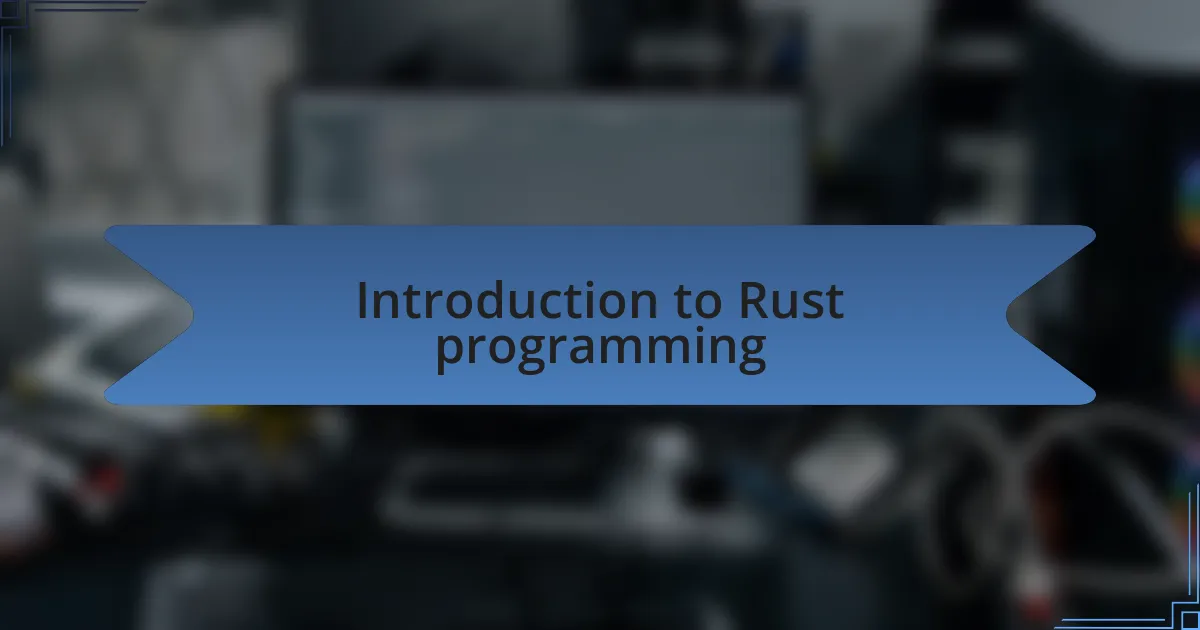
Introduction to Rust programming
Rust is a systems programming language that emphasizes safety and performance, making it a compelling choice for developers. I remember when I first encountered Rust’s ownership model; it felt like learning a new way to think about memory management. This approach not only prevents bugs but also forced me to be more deliberate in my coding.
One of the things that drew me to Rust was its vibrant community and the philosophy of open-source collaboration. I often found myself on forums, engaging in lively discussions about best practices and shared challenges. Have you ever felt the exhilarating rush of solving a tough coding problem with the help of others? It’s a profound moment that makes you appreciate the language even more.
As I delved deeper into Rust, I was fascinated by its intricate type system and how it promotes writing safe code without sacrificing performance. Initially, I struggled with the syntax and concepts, but with persistence, I began to appreciate the clarity it brings to development. It’s like unlocking a new level in a game; the more I learned, the more rewarding it became. Have you faced similar hurdles in your programming journey? Embracing those challenges often leads to the most significant growth.
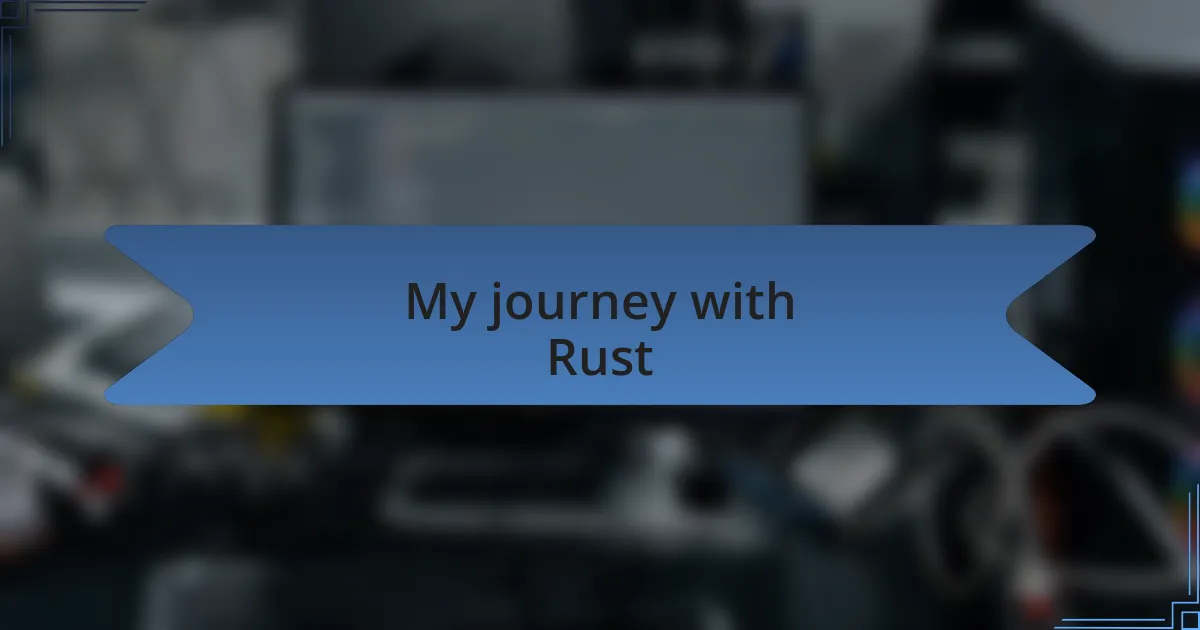
My journey with Rust
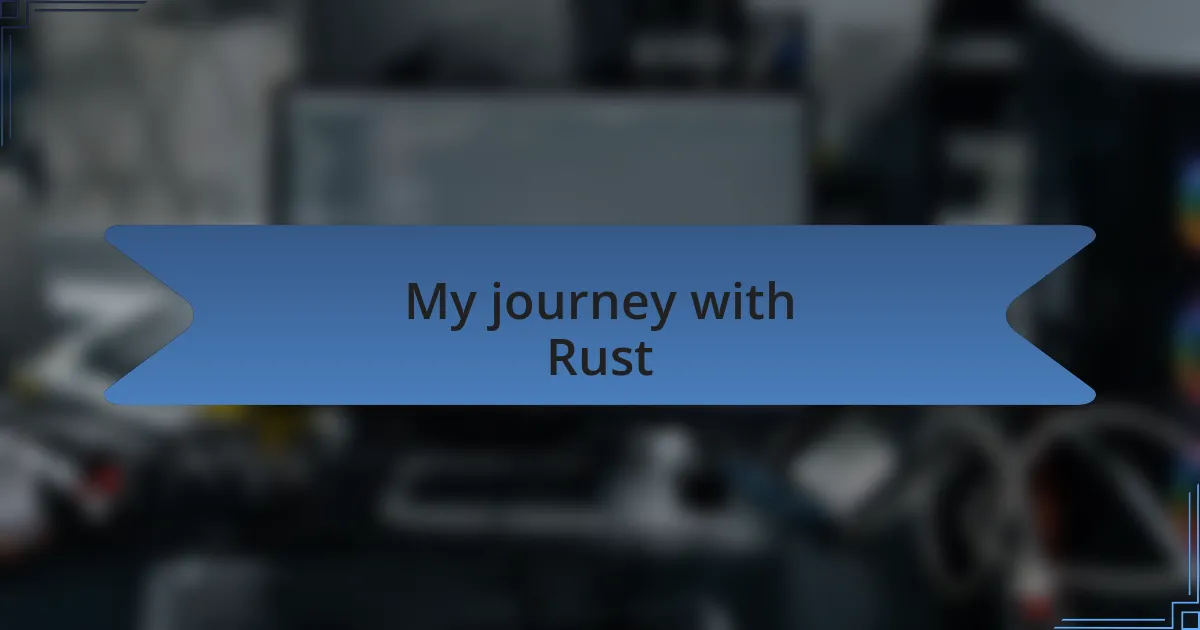
My journey with Rust
The first time I wrote a simple “Hello, World!” in Rust, I felt a strange mix of excitement and apprehension. Would the concepts I had read about really make coding easier, or would I just find myself frustrated? That first successful run ignited a flame of curiosity within me, pushing me to explore what more this language could offer.
As my journey continued, I faced a particularly challenging project that involved multithreading. Initially, the complexities of ensuring thread safety left me feeling overwhelmed. But through countless trials—and yes, a fair share of debugging—I eventually crafted a solution that not only worked but felt elegant. Have you ever tackled a problem that made the struggle worthwhile? That sense of accomplishment is unlike anything else.
Along the way, I discovered Rust’s robust documentation, which became my go-to resource for troubleshooting. Each time I referenced it, I felt like I was returning to a trusted friend who patiently guided me through the tough spots. It’s fascinating how a well-crafted resource can transform confusion into clarity, isn’t it? The more I engaged with Rust, the more I felt part of a larger narrative in software development—one filled with endless possibilities.
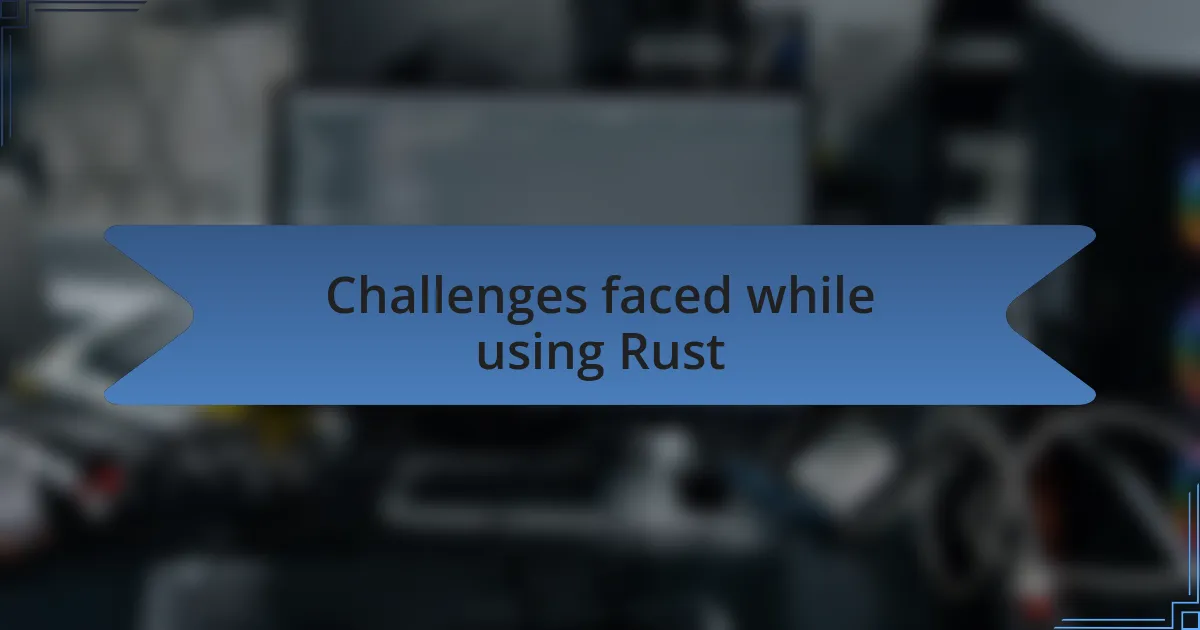
Challenges faced while using Rust
Working with Rust has certainly come with its own set of hurdles. One of the most prominent challenges I encountered was the steep learning curve associated with its ownership model. When I first started, I struggled to grasp how Rust manages memory safety without a garbage collector. It felt like I was constantly wrestling with the compiler over issues of ownership and borrowing. Have you ever faced a barrier that seemed insurmountable? For me, each error message was a reminder that I needed to rethink my approach.
Additionally, I found that the ecosystem, while growing, still lacks some libraries compared to more established languages. In one instance, I attempted to implement a feature that I had easily executed in other languages, only to realize there wasn’t an equivalent library in Rust. It was a bit disheartening at first. However, this pushed me to dive deeper into writing my own implementations—a challenge that ultimately rewarded me with a sense of empowerment. Isn’t it interesting how constraints can lead us to discover new skills?
Another significant challenge came from Rust’s focus on strict type safety. On several occasions, I found myself lost in type annotations and generics. While this rigor can safeguard against errors down the road, it occasionally felt like I was spending more time figuring out types than actually coding. I remember a day spent debugging a simple function, only to realize hours later that a misplaced type annotation was the culprit. It’s moments like these that question my patience and endurance as a developer. Have you ever experienced frustration from what seemed like a simple oversight? It’s a reminder of how the smallest details can dramatically influence the development process.
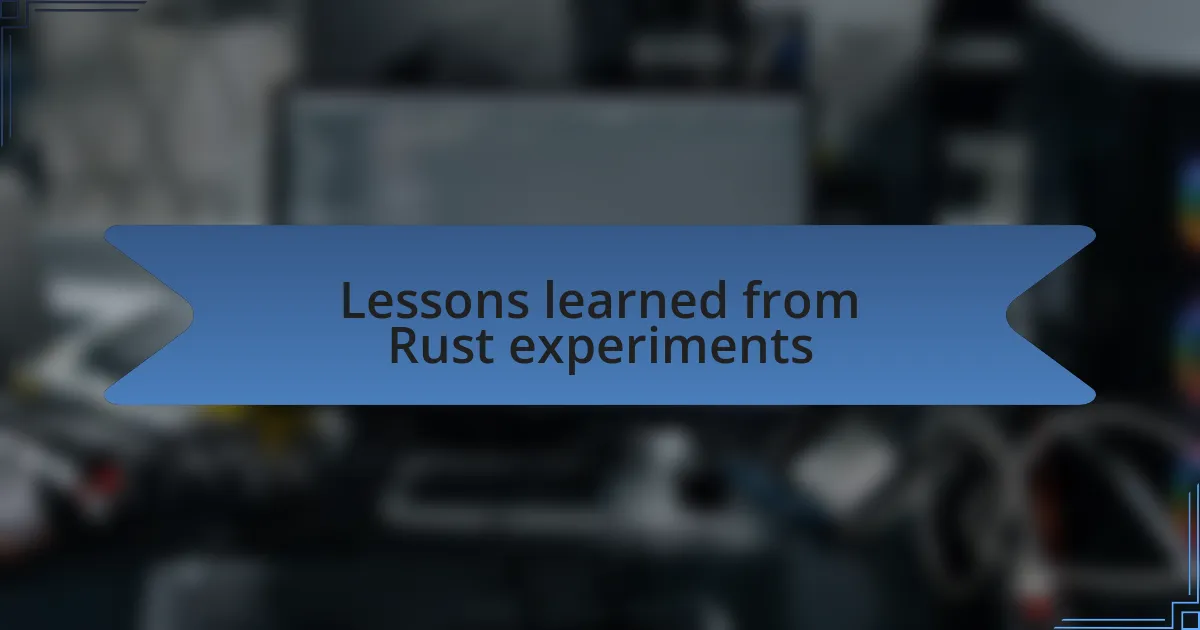
Lessons learned from Rust experiments
Experimenting with Rust has taught me the importance of embracing the compiler as a tool rather than an obstacle. Initially, I viewed those lengthy error messages as roadblocks, but as I gained experience, I realized they were insightful guides. Each time I tackled a compilation error, I discovered nuances about Rust’s borrowing and ownership that deepened my understanding of safe memory management. Have you ever turned a frustrating situation into a learning opportunity? For me, this transformation was pivotal.
One unexpected lesson was the value of community engagement. When I hit a wall with implementing async features, I reached out to online forums and local Rust meetups, and the support was incredible. Through shared experiences and collaborative problem-solving, I found solutions more efficiently than I could have alone. Isn’t it encouraging to know that others share similar struggles? This sense of camaraderie has reinforced my belief that the development journey is not just about coding; it’s also about building connections.
Another takeaway was the discipline required for code organization and modularity that Rust demands. I remember reorganizing my project structure multiple times just to adhere to best practices. At first, this felt tedious, but in retrospect, I’ve grown to appreciate how properly structured code leads to improved maintainability. Has a project ever tested your commitment to clean coding practices? I found that these experiences ultimately sharpened my skills and made me a more thoughtful developer.
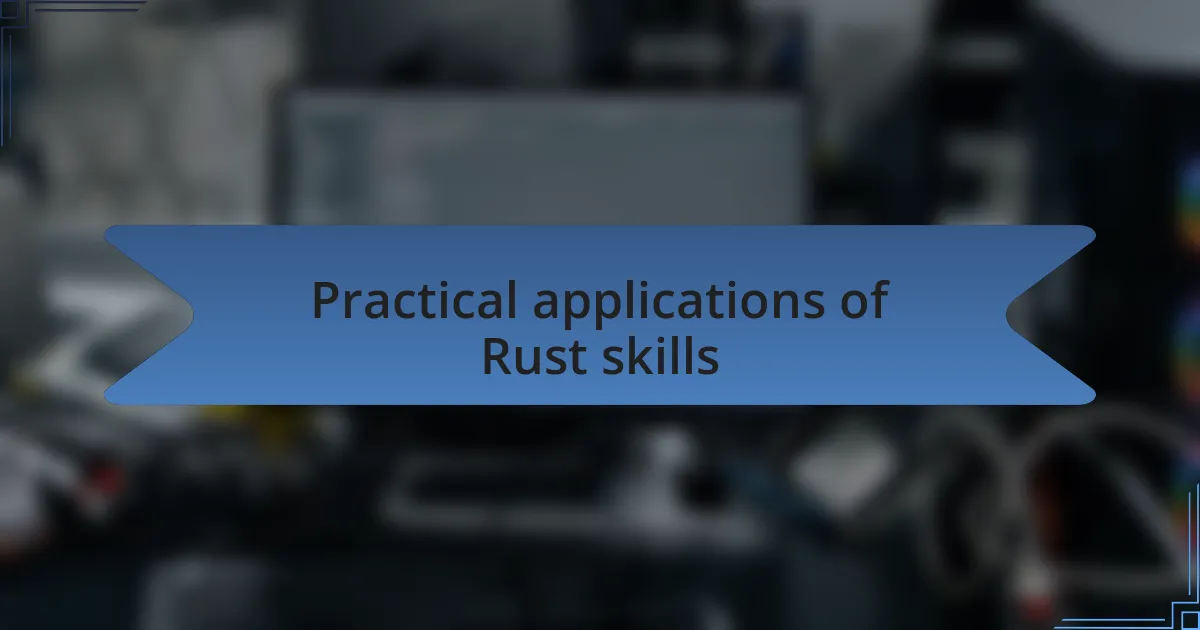
Practical applications of Rust skills
One practical application of my Rust skills emerged when I decided to build a web server. As I implemented asynchronous programming features, I truly grasped the power of Rust’s concurrency model. Have you ever felt the thrill of seeing your code handle multiple tasks simultaneously without a hitch? That rush of efficiency inspired me to dive deeper into ecosystem libraries such as Hyper and Actix, which opened doors to developing high-performance applications.
Moreover, I found that Rust’s focus on safety and performance was a game-changer in developing systems-level applications. I once wrote a small tool for system monitoring, and the experience was eye-opening. I realized how Rust’s strict compile-time checks helped me eliminate bugs before they even reached the runtime. Isn’t it comforting to know that the language encourages you to think carefully about how your data is handled? This practice not only strengthened my debugging skills but also fostered a more disciplined approach to software design.
Finally, the skills I honed in Rust have proven invaluable when crossing over to languages like C and C++. I remember feeling apprehensive about memory management in those languages, but my Rust background equipped me with a solid understanding of ownership principles. Have you ever felt that surge of confidence when tackling a new challenge? For me, bringing those Rust insights into other environments has made me a more adaptable and resourceful developer.